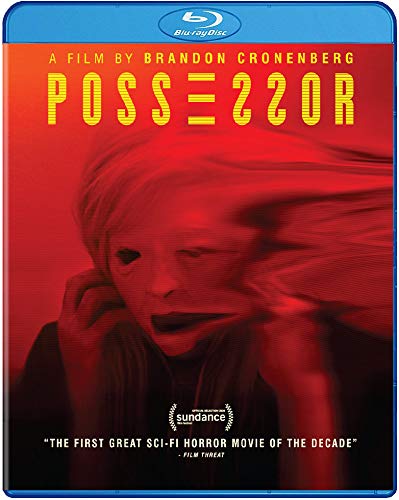
Written by Ram Venkat Srikar
When someone asks me what a film is about, I’m often puzzled whether to share the synopsis of the film, or tell what the film is actually about. Take the case of Parasite, for instance. It’s the story of a poor family infiltrating a rich family to make money. What is it actually about, though? The persistent, wide gap between classes in a capitalist world. A layered screenplay bestows such depth, the duality, or what we call, subtext. Ignore the subtext, you still have a coherent film.
Likewise, I can surely tell the story of Brandon Cronenberg’s sophomore effort, Possessor. It follows Tasya (Andrea Riseborough), an assassin working for a vague tech-based corporation that uses brain-implantation as a medium to take control over people’s bodies and murder the target through the possessed. On one such job, which should be no different from any of her earlier assassinations, she is stuck in the body of the person, Colin (Christopher Abbott), she is currently possessing. There you have the plot and conflict. However, it’s certainly not your conventional body horror, since it thrives on ambiguity. Unlike other films, it’s hard to discern what the film is about. It’s more about the experience – which will stick in my mind – than the logical dissection.
Is the whole film Tasya’s guilt-propelled trip in her subconscious? Is it about Colin gradually surmising his desires, aided by Tasya’s subconscious? Or, is it about the coexistence of both their subconsciousnesses? The questions are endless. The more I think, the more questions it raises. Perhaps this is what makes Possessor such an intriguing watch. In addition to being riveting, it’s consistently shocking, both with the ideas and visuals. There is a continual threat. Everyone’s in a dread-zone, which is why the tension is perpetual. Like how a good horror film keeps the viewers on their toes about the next possible scare, Possessor keeps you alert. However, fear or intrigue is majorly cerebral here. It’s not exactly the gore or violence that appalls, but the sheer extent of human nature and its adversity that lead to the violence. This is how, I felt, a coherent, conventional Gasper Noé film would be like. With patterns – from crosses to butterflies – prevalent through the imagery, there’s more to what’s at play. It’s a heist movie, as well.
Once Tasya understands she is trapped in Colin’s body, the psychological facets from the virtuality transcend into real-world consequences. They are a punch in the gut. Both for Tasya and us. Cronenberg is concerned little about keeping the viewers comfortable. Watching Possessor both contradicts and abides by a conventional horror movie-viewing experience. It’s ridden with anxiety, it’s distressing at times, but I craved for more; the right kind of discomforting. It’s cruel.
Similarly, there’s a duality to these characters. What they are on the outside and what they are on the inside. For instance, Tasya is grappling with being a hit-woman and mother, as both these individualities tear her integrity. She is coping with her life and identity. Likewise, after possessing Colin, it feels like both their worlds merge. Tasya’s life starts echoing in Colin’s, who we hardly get to see as himself. Is he a somber person as Tasya’s enacting him? We don’t know, but at a point, you are concerned for the real Colin, which is a major writing achievement considering how little we know about him.
The focus is on psychological horror, as much as it is about body horror, coexisting in a sci-fi zone that never feels tech-high owing its reliance on the human nature of its characters. The universe of the film, too, marries dystopian nature with the futuristic complexion to tell how cold the world becomes as it progresses with time. It only invigorates the film’s story or characters whose choices and actions are independent of the world. It’s reminiscent of Her, a light relationship drama – contrary to Possessor in every way possible – which is also set in a futuristic world. Neither of these movies needs a futuristic setting since they thrive on human nature, which I wonder, would ever change.
Perhaps Possessor is also a relationship drama about two people influencing each other’s subconscious, subsequently changing their lives. It is plausible considering how strained or cold their relationships with their partners are painted. Possessor is smarter than what it appears to be. The fact that this film – about a woman getting into a man’s mind – is more frightful than any horror film in recent times that has supernatural elements at play, tells that the bare human psyche and its repercussions are the most terrifying aspect of the real world. That’s where Possessor hits it out of the genre.